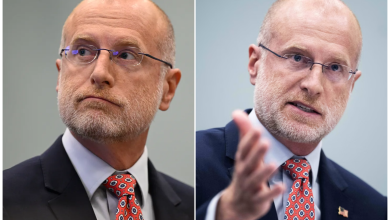The Purge: How Charlie Kirk's Assassination Ignited a Free Speech Firestorm and a Wave of Firings
In the raw, volatile aftermath of Charlie Kirk’s assassination, a second, quieter wave of destruction is sweeping the nation. This one isn't being carried out by a sniper's bullet, but by screenshots, hashtags, and human resources departments. A massive and unprecedented clampdown on speech has been unleashed, and in its wake, a growing number of Americans—teachers, firefighters, military personnel, journalists, and even a Secret Service agent—are losing their jobs, their reputations, and their sense of security. The tragedy of Kirk's murder has ignited a brutal and complex debate about the limits of free speech, the power of online mobs, and the stunningly swift consequences of expressing an opinion in a hyper-partisan era.
The purge began almost immediately. As the nation processed the shock of the assassination, the internet was flooded with a torrent of reactions, ranging from heartfelt grief to callous celebration. It was this latter category that drew the attention of a newly mobilized and highly effective online movement. Conservative figures and activists, led by prominent voices like Laura Loomer and Scott Presler, issued a chilling promise to anyone seen to be «making light of» or celebrating Kirk’s death. “Prepare to have your whole future professional aspirations ruined,” Loomer posted on X. “I’m going to make you wish you never opened your mouth.”

It wasn't an idle threat. These activists began a coordinated effort to collate and expose examples of what they deemed objectionable commentary, sharing screenshots of posts along with the names and workplaces of the individuals who wrote them. The effect was immediate and devastating. Employers, facing a deluge of public pressure, began to act.
In Florida, two educators in Clay County were removed from their classrooms and placed under state investigation. One, an elementary school teacher, posted an article about the shooting with the caption, “This may not be the obituary we were all hoping to wake up to, but it is a close second for me.” The other, a high school counselor, made a pointed reference to Kirk’s own controversial 2023 statement that it was “worth it” to have “some gun deaths” to protect the Second Amendment. The counselor wrote, “37 years in public education, ready to take a bullet for my kids. No I’m not shedding a tear, he chose to sacrifice himself for the rights [to] be protected. Karma’s a bitch.” A Republican state senator called the comments «egregious» and «hateful.»

The firings and suspensions have cut across a wide swath of American life. The Carolina Panthers, a prominent NFL team, fired a communications coordinator for an Instagram post that asked, “Why are y’all sad? Your man said it was worth it.” A reporter covering the Phoenix Suns lost his job for posting, “Truly don’t care if you think it’s insensitive or poor timing to decline to respect an evil man who died.” A New Orleans firefighter is under investigation for a since-deleted comment that called the bullet that killed Kirk “a gift from god.” A teacher in Oregon was fired for saying Kirk's death had «really brightened up my day.»
The government has also entered the fray. The Trump administration has promised action against foreign nationals praising the killing, and Defense Secretary Pete Hegseth has ordered the Pentagon to “find and identify military members” who mocked the murder. According to reports, several members of the military have already been relieved of their duties.
Perhaps the most high-profile casualty of this clampdown was Matthew Dowd, a veteran political analyst who was fired by MSNBC for his on-air commentary suggesting Kirk's own rhetoric contributed to the violence. “Hateful thoughts lead to hateful words, which then lead to hateful actions,” Dowd said. While the network issued an apology, Dowd later claimed he was the victim of a “rightwing media mob.”
His firing highlights the impossible tightrope media figures and ordinary citizens alike must now walk. In a moment of intense national grief and anger, where is the line between political analysis and victim-blaming? Between a tasteless joke and a fireable offense? The swiftness and severity of the consequences have sparked a fierce debate about whether this is a necessary correction against heartless commentary or a dangerous slide into censorship, where any opinion that deviates from a prescribed script of mourning can result in professional ruin.
Charlie Kirk himself was a fervent, if complicated, advocate for free speech. His campus events were often designed to provoke and challenge, to push the boundaries of acceptable discourse. The irony that his death has now become the catalyst for a nationwide crackdown on speech is profound. This moment has laid bare the deep contradictions in America's relationship with the First Amendment. We champion free speech in the abstract, but in the face of tragedy, our tolerance for speech we find offensive evaporates. The purge following Kirk's assassination is a terrifying and sobering reminder that in the court of public opinion, the verdict is often swift, and the sentence can last a lifetime.



